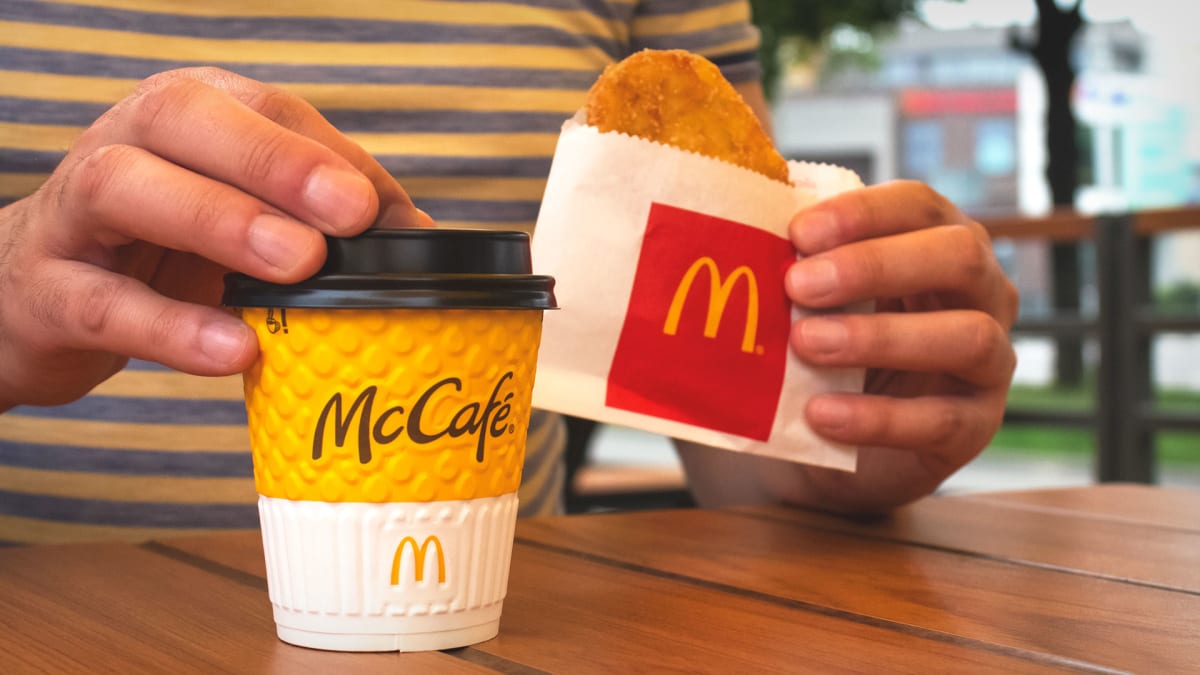
While some companies that own multiple restaurant concepts might house multiple brands under the same roof, they're generally separate locations inside the same building. Yum Brands (YUM) does this with KFC, Pizza Hut, and Taco Bell.
It's sort of a food court of owned-and-operated brands that gives added choice to consumers. Dunkin' does the same thing with its Baskin Robbins ice cream brand and Dine Brands (DIN), which owns both Applebee's and IHOP even has a few locations where both brands are housed under the same roof.
DON'T MISS: McDonald's Menu Adds a Big New Burger (Burger King's Is Bigger)
What you never see, however, even when it seems obvious, is one brand's food sold at another brand's restaurant. Restaurant Brands International (QSR), for example, owns both Burger King and (mostly) Canadian coffee chain Tim Horton's. It would be extremely logical to sell Tim's coffee in U.S. Burger King locations, but it has never happened.
That's probably due to franchise agreements as it's probably easier for a company to make a deal with an outside provider than negotiate sharing agreements between its own franchisees. Tim Horton's franchisees may not want to see their brand in Burger King (even if the locations are not close) and Taco Bell franchisees may not want to see Pizza Hut owners being able to sell Nacho Fries.
McDonald's (MCD), however, has been working with another big name -- Krispy Kreme (DNUT) -- in select locations. The two companies also compete, at least in some markets, but they're collaborating in a way that could be good for the franchisees of both companies.
Now, that deal has expanded and it could be inching toward a much wider rollout.

Shutterstock
Krispy Kreme and McDonald's Expand Test
Krispy Kreme and McDonald's joined forces back in Nov. for a small test where the burger chain would sell three flavors of doughnuts in a handful of its locations. Now, the two companies are expanding that relationship.
"Get a bite of this... next month, McDonald’s is bringing Krispy Kreme doughnuts to even more local restaurants with an expanded market test. Starting March 21, we’ll be serving three Krispy Kreme fan faves -- the Original Glazed Doughnut, the Chocolate Iced with Sprinkles Doughnut, and the Chocolate Iced Kreme Filled Doughnut -- at approximately 160 locations across Louisville, Lexington, and the surrounding area," Krispy Kreme shared in a press release.
McDonald's has offered various pastries as part of its morning menu, but it certainly can't produce anything that rivals Krispy Kreme's doughnuts. This deal, which in some ways means Krispy Kreme is competing with itself, also serves the coffee and doughnut chain's business model.
Krispy Kreme Is Both Retail and Wholesale
Krispy Kreme owners operate central bakery-equipped restaurants that serve not only any satellite stores they operate but also wholesale partners like grocery and convenience stores. The company explained its model a little bit in the press release.
"As part of our omni-channel strategy, we’re always looking for ways to get our customers more access to the fresh doughnuts they crave through our Delivered Fresh Daily network," it shared.
Basically, Krispy Kreme accepts that its customers may choose to visit other restaurants and retailers. If the company sells its doughnuts at those locations it at least captures some revenue, while if it only sold its doughnuts at its stores it may never capture some of those sales.
McDonald's would be a logical partner for Krispy Kreme on a nationwide basis, and this test is designed to help the doughnut chain "learn more about operational impact on a larger scale as well as explore customer demand."
In addition, while McDonald's has over 13,000 U.S. locations, Krispy Kreme has less than 400. It's conceivable the chain could build out its wholesale capacity as it already services grocery and convenience stores in markets where it does not operate standalone stores, but that would like take some time.
Related Articles:
- Why Does Fountain Diet Coke Taste Better at McDonald's?
- What Is on the McDonald's Hidden Menu?







